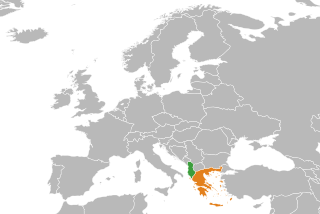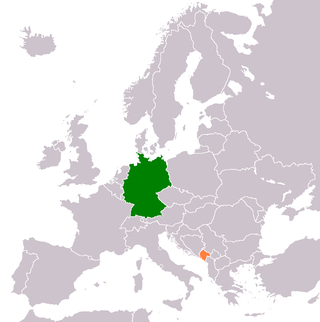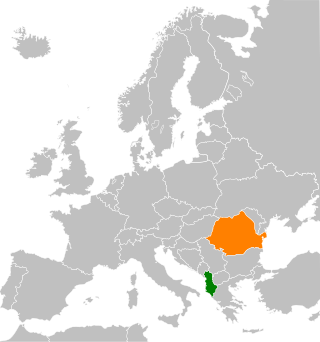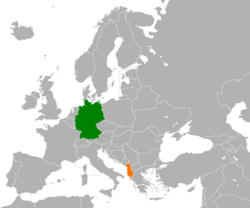The foreign relations of Albania are its relations with other governments and peoples. Foreign relations are conducted through the Ministry of Foreign Affairs in Tirana. The current minister is Igli Hasani. The current Ambassador to the United Nations is Ferit Hoxha.

Albania–Greece relations are diplomatic relations between Albania and Greece. They are influenced by factors such as the presence of Albanian immigrants in Greece, the Greek minority in Albania, historical and cultural ties, and interactions between the governments of both countries.

The establishment of diplomatic relations between Albania and the Soviet Union happened on April 7, 1924. Both countries were also allies in the Warsaw Pact. Albania has an embassy in Moscow. Russia has an embassy in Tirana.

Relations exist and have existed between Austria and Turkey and their predecessor states, the Habsburg monarchy and Ottoman Empire respectively. The countries fought as allies during the First World War. The countries have since had normal relations, however Austrian opposition to the Accession of Turkey to the European Union has become a point of tension. Both countries are members of the Council of Europe. Austria is an EU member and Turkey is an EU candidate. Austria opposes Turkey's accession negotiations to the EU, although negotiations have now been suspended. Turkey is a member of NATO. Austria is not a member of NATO.

Albania and Turkey have close foreign relations. Albania has an embassy in Ankara and a general consulate in Istanbul. Turkey has an embassy in Tirana. The most widespread religion in Albania is Islam (~59%), also in Turkey (~90%). Both are part of the Organisation of Islamic Cooperation (OIC), the North Atlantic Treaty Organization (NATO) and Union for the Mediterranean (UfM). Turkey and Albania are candidates for accession in the European Union (EU).

German-Montenegrin relations are foreign relations between Germany and Montenegro. Both countries established diplomatic relations on 14 June 2006. Germany has an embassy in Podgorica. Montenegro has an embassy in Berlin and a general consulate in Frankfurt. Both countries are members of Council of Europe and NATO. Also Germany is an EU member and Montenegro is an EU candidate. In 1997 the German Bundeswehr used the Podgorica Airport for the Operation Libelle, which led to the first skirmish involving German forces since World War II.

The foreign relations between Albania and Croatia are bound together by shared history, neighboring geography and common political ideologies. Both states established diplomatic relations in 1992, following the dissolution of Yugoslavia and the independence of Croatia. They have historically shared a special relationship due to their convergent nation-building efforts. Modern relations are warm and friendly.

Albania has an embassy in Copenhagen, and Denmark has an embassy in Tirana. Both countries are members of NATO. Also Albania is an EU candidate and Denmark is an EU member. Diplomatic relations were established in 1970. On 23 June 1971, a trade agreement was signed.

Albania has an embassy in the Hague and the Netherlands has an embassy in Tirana.
Peter Schubert was a German albanologist and diplomat. He worked more than 35 years in the diplomatic service of the former GDR and was an ambassador to Albania.

Albania has an embassy in Bucharest and Romania an embassy in Tirana and a consulate in Korçë. On 16 December 2013, a celebration was held in Romania celebrating the hundredth anniversary of the establishment of diplomatic relations between the two nations.

Albania–Italy relations are the bilateral relations between Albania and Italy. Albania has an embassy in Rome and two general consulates in Bari and Milan. Italy has an embassy in Tirana and a general consulate in Vlorë.

The diplomatic relations between Albania and Ukraine were established in 1922. In September 2020, Ukraine opened an embassy in Tirana. Albania is accredited to Ukraine from its embassy in Warsaw, Poland and has an honorary consulate in Kharkiv. Both countries are full members of the BSCE and COE. Albania is membership for the NATO which Ukraine applied for in 2022.

Albania and France are members of the North Atlantic Treaty Organization (NATO) and the Organization for Security and Co-operation in Europe (OSCE). Albania is an EU candidate and France is also an EU member.

Albania has an embassy in Budapest and Hungary has an embassy and a consular office in Tirana. The history of diplomatic relations of Albania and Hungary dates back to 1912, when Albania declared its independence on November 28, 1912.

Albania has an embassy in Lisbon and 3 honorary consulates in Porto, Funchal and in the island of Madeira. Portugal has an honorary consulate in Tirana. The history of diplomatic relations of Albania and Portugal dates back to 1922, when Portugal recognized Albania's independence on May 25, 1922.

Formal relations between Albania and Spain were established in 1986. Albania has an embassy in Madrid, and Spain has an embassy in Tirana.

Albania has an embassy in Vienna and 7 honorary consulates in Eisenstadt, Gössendorf, Graz, Grödig, Salzburg, St. Pölten and Villach. Austria has an embassy in Tirana. The history of diplomatic relations of Albania and Austria dates back to 1912, when Albania declared its independence on November 28, 1912. As a European Union (EU) member, Austria supports Albania in its euro-integration path.

Albania–Poland relations are diplomatic relations between the Republic of Albania and the Republic of Poland. Poland was the first Slavic nation to recognize Kosovo as an independent entity, however the relationship between the two nations is lower than usual. Nonetheless, the two countries have been working closer since the fall of communism at 1989 and there has been strong renewal of relationship between two nations.
Albania–Slovakia relations are the bilateral relations between Albania and Slovakia. Albania has an embassy in Bratislava. Slovakia has an embassy in Tirana. Both countries are members of the Council of Europe and the Organization for Security and Co-operation in Europe.




















